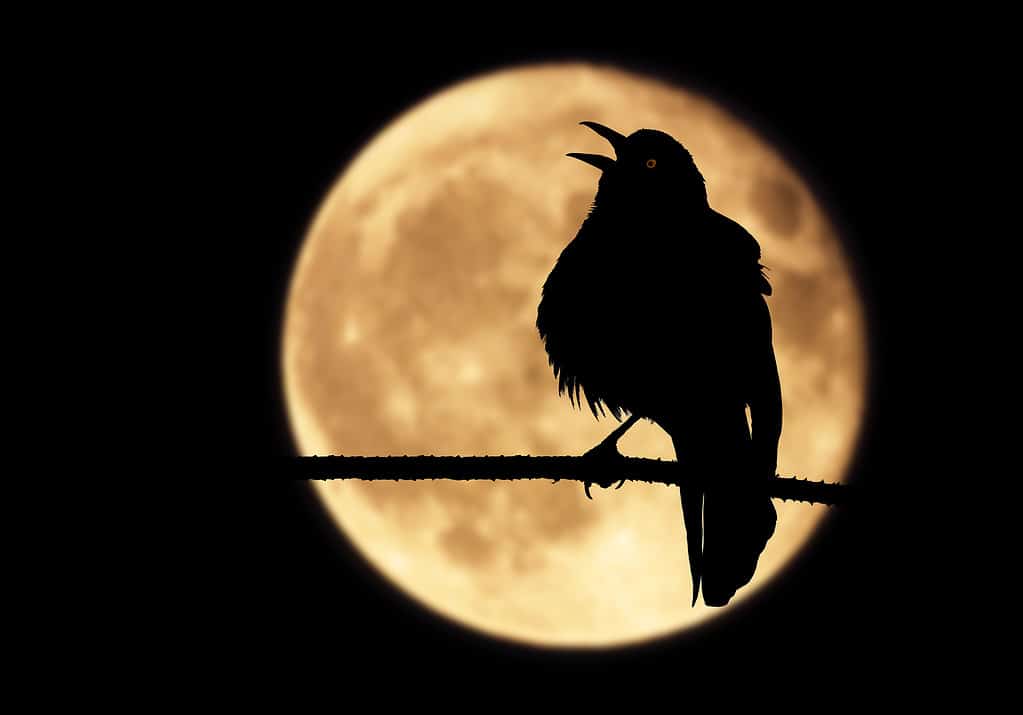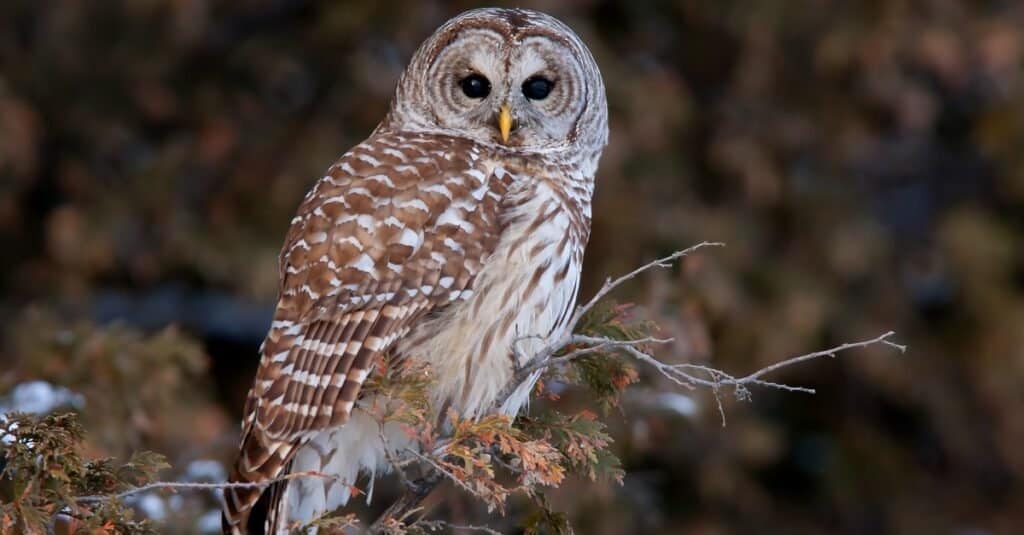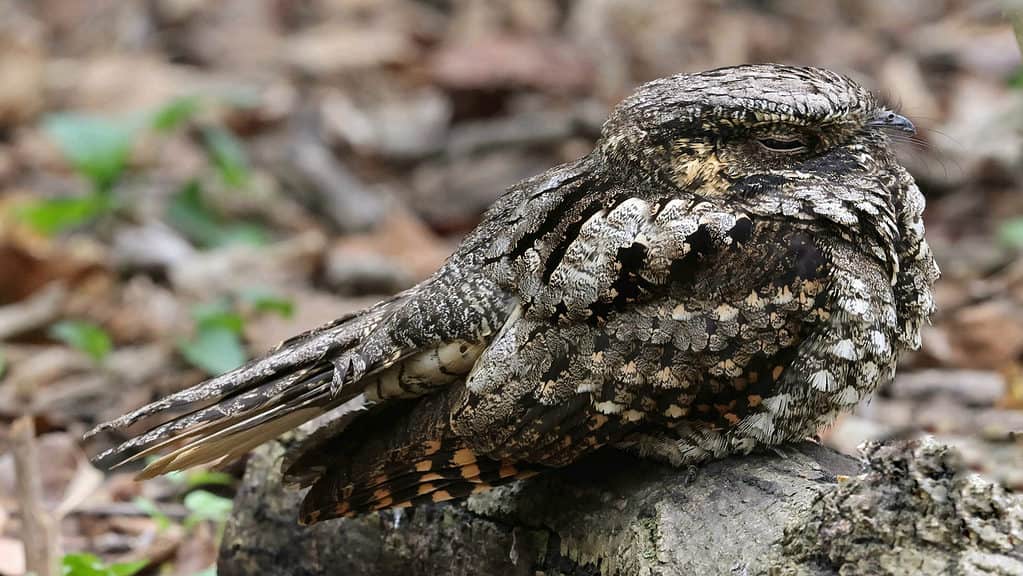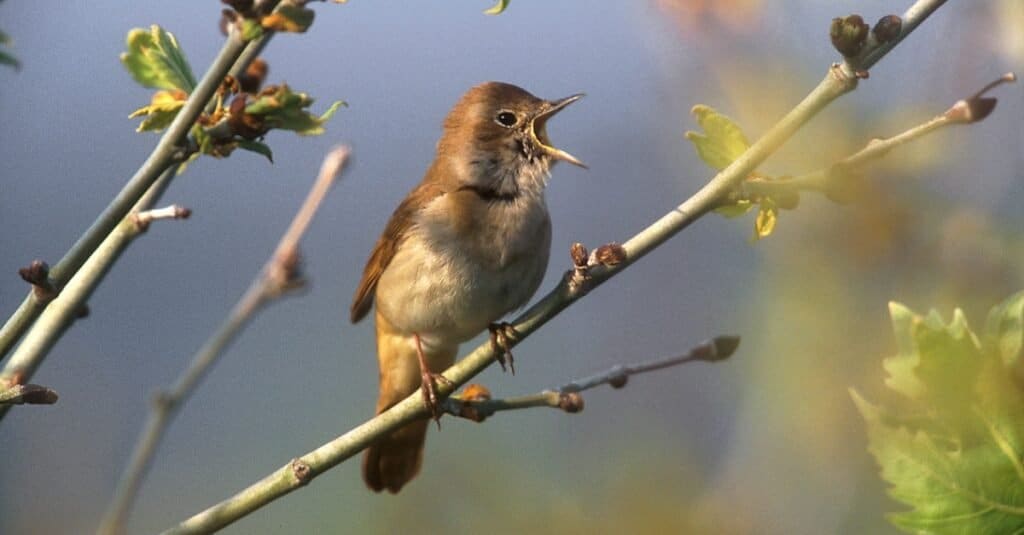There’s nothing like hearing the diverse songs of birds on a spring morning. Their cheery trills invigorate and motivate, like nature’s personal alarm clock. Many people enjoy chirping and singing birds during the day. But hearing one at night can be a little unsettling.
When day turns to night, humans wind down to rest. But many animals are just waking up. And they spend the night flying or hopping around in search of food. If you hear birds chirping near your window at night, you may wonder what it could mean. Birds chirping at night can mean several things. Discover why they do it, what it means, and if it is a bad omen.
Why Are There Birds Chirping at Night?

Birds sing at night for various reasons, such as to attract mates, warn of dangers, claim their territories, or to communicate during migration.
©Mike Truchon/Shutterstock.com
The primary reason birds chirp at night or any other time is to communicate. During the spring, you may notice an uptick in nighttime singing and chirping. This phenomenon is quite simple: spring is mating season. Male birds that are typically quiet throughout the year may become more vocal in order to attract a mate. And once the chicks hatch, you may hear baby birds chirping at night to be fed by their parents. Young birds may also test their new vocal abilities by singing after dark, which is kind of like when kids stay up after their bedtime.
Migrating birds during the fall may get loud after dark, as well. They use sounds to communicate while flying. One member of a flock may honk to let others in the group know there’s food nearby.
Birds can also chirp at night to warn other birds of a potential threat. Late-night warning choruses are not unusual, especially during the spring. And some can get loud when claiming their territories, which is especially true during the breeding season.
And lastly, birds may get confused by light pollution. Birds, like robins, are vulnerable to confusion from artificial light. When there is too much light pollution, birds may become disoriented and thrown off schedule, if you will. If there’s too much light after dark, they may think it’s earlier than it is.
If you’re curious, check out this article about the birds that sing the most beautiful songs in the world.
What Birds Chirp at Night?
Several species may stay up later than usual during certain times of the year. But others are actually nocturnal, meaning they rest during the day and become active at night. Nocturnal birds, such as owls, may make more noise than diurnal or crepuscular (those active during dawn and dusk) species.
Barred Owl

Barred owls can be vocal year-round, but their calls become more persistent from February to August.
©Jim Cumming/Shutterstock.com
Barred owls are large North American owls and are one of the most common in the region. They are very vocal birds, often producing quite a raucous in the trees at night. If you live close to a wooded or swampy area, you may have heard this species a time or two. They can be vocal year-round, but their calls become more persistent from February to August, beginning with their courtship and mating rituals. You may even hear a strange duet when pairs chase each other and sing back-and-forth songs called caterwauling.
Eastern Whip-Poor-Will

The eastern whip-poor-will is a medium-sized nightjar from North America. They are the quintessential sound of the country on a summer night.
©iStock.com/Banu R
Named after their famous “whip-poor-will” songs, these camouflaged birds can repeat their energetic songs for hours. The male’s songs are the quintessential sound of the country on a warm summer night. These nocturnal birds make their loud calls for the same reasons as other birds: to attract mates, express agitation, and ward off predators.
Is Hearing Birds Chirping at Night a Bad Omen? What Does it Mean?
Hearing birds chirping at night can mean many things. Some people look at hearing nighttime chirping as a bad omen, while others believe that good things are coming your way. But hearing birds at night really only means one thing: the continuance of life.
Birds make more noise at night during the spring, which is their breeding season. An adult bird creates life, that goes on to create more life. Life goes on, continuing its cycle. If anything, hearing birds chirping at night is a remembrance to embrace life, let the past go, and move forward.
Bonus: Nightingales Are Known for Their Beautiful Nocturnal Songs

Nightingales have inspired many stories and poems.
©iStock.com/MikeLane45
There is one bird with a repertoire of nocturnal melodies that are so hauntingly beautiful it has inspired countless poems and songs written by admiring humans. The nightingale has become synonymous with the music of the night – and the male birds are known to sing in up to 260 song variations. The bird’s plain appearance betrays its status as the Pavarotti of the bird world.
Male nightingales sing to attract mates and compete to perform the best song in fierce competition. Half of the birds won’t mate at all – so honing their skill is crucial. The brave little nightingale makes himself open to predators by singing in full voice – risking his life for a chance at love. It’s no wonder they have been immortalized in poetry – they are gallant symbols of romantic love!
The photo featured at the top of this post is © Mike Truchon/Shutterstock.com
Thank you for reading! Have some feedback for us? Contact the AZ Animals editorial team.






